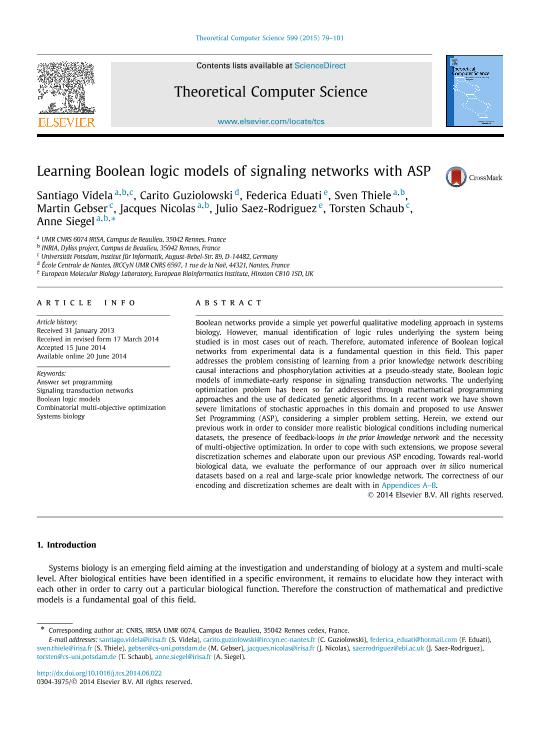Artículo
Learning Boolean logic models of signaling networks with ASP
Videla, Santiago ; Guziolowski, Carito; Eduati, Federica; Thiele, Sven; Gebser, Martin; Nicolas, Jacques; Saez Rodriguez, Julio; Schaub, Torsten; Siegel, Anne
; Guziolowski, Carito; Eduati, Federica; Thiele, Sven; Gebser, Martin; Nicolas, Jacques; Saez Rodriguez, Julio; Schaub, Torsten; Siegel, Anne
 ; Guziolowski, Carito; Eduati, Federica; Thiele, Sven; Gebser, Martin; Nicolas, Jacques; Saez Rodriguez, Julio; Schaub, Torsten; Siegel, Anne
; Guziolowski, Carito; Eduati, Federica; Thiele, Sven; Gebser, Martin; Nicolas, Jacques; Saez Rodriguez, Julio; Schaub, Torsten; Siegel, Anne
Fecha de publicación:
09/2015
Editorial:
Elsevier Science
Revista:
Theoretical Computer Science
ISSN:
0304-3975
Idioma:
Inglés
Tipo de recurso:
Artículo publicado
Clasificación temática:
Resumen
Boolean networks provide a simple yet powerful qualitative modeling approach in systems biology. However, manual identification of logic rules underlying the system being studied is in most cases out of reach. Therefore, automated inference of Boolean logical networks from experimental data is a fundamental question in this field. This paper addresses the problem consisting of learning from a prior knowledge network describing causal interactions and phosphorylation activities at a pseudo-steady state, Boolean logic models of immediate-early response in signaling transduction networks. The underlying optimization problem has been so far addressed through mathematical programming approaches and the use of dedicated genetic algorithms. In a recent work we have shown severe limitations of stochastic approaches in this domain and proposed to use Answer Set Programming (ASP), considering a simpler problem setting. Herein, we extend our previous work in order to consider more realistic biological conditions including numerical datasets, the presence of feedback-loops in the prior knowledge networkand the necessity of multi-objective optimization. In order to cope with such extensions, we propose several discretization schemes and elaborate upon our previous ASP encoding. Towards real-world biological data, we evaluate the performance of our approach over in siliconumerical datasets based on a real and large-scale prior knowledge network. The correctness of our encoding and discretization schemes are dealt with in Appendices A–B.
Archivos asociados
Licencia
Identificadores
Colecciones
Articulos(IIBBA)
Articulos de INST.DE INVEST.BIOQUIMICAS DE BS.AS(I)
Articulos de INST.DE INVEST.BIOQUIMICAS DE BS.AS(I)
Citación
Videla, Santiago; Guziolowski, Carito; Eduati, Federica; Thiele, Sven; Gebser, Martin; et al.; Learning Boolean logic models of signaling networks with ASP; Elsevier Science; Theoretical Computer Science; 599; 9-2015; 79-101
Compartir



